Lament for a Stasi officer
“We just met here with a group of our Germans. Native Germans who have been bringing humanitarian aid here for 8 years. Which were in Gorlovka, which were in other cities. Who made 800 projects for the people who live here – peaceful people who have been bombed by Ukrainian fascists all this time. And these people, our Germans, they continue to help, despite the sanctions that have been imposed against them,” sobbing pro-Kremlin activist Yelena Kolbasnikova, in a report on the Tsargrad TV channel. Kolbasnikova became famous after the invasion of Ukraine began – together with her husband Maxim Shlund ( who turned out to be a previously convicted Russian Rostislav Teslyuk), she organized actions in Cologne in support of the Kremlin. The Insider has already written about Kolbasnikova's connections with the German far right, the Russian Consulate General and the Russian House in Berlin.
In the Tsargrad report, Kolbasnikova talks about Liana Kilints, chairman of the Bridge of Peace – Help for War Victims Foundation (Friedensbrücke – Kriegsopferhilfe eV), registered in Germany. Kilints was born in the family of an employee of the Ministry of State Security of the GDR (Stasi). The agency is known for its repressive methods against dissidents. “Father was forbidden to work for the rest of his life. And why? Because he served my homeland, my state,” complains Kilints in a propaganda film by former Russian intelligence agent Anna Chapman. The activist is engaged in various initiatives – from humanitarian supplies to civilians in the affected areas to organizing events in Russia with the participation of children from Donbass, together with the authorities of the so-called DPR. On May 9, 2022, she unfurled the “DPR” flag in front of the monument to a Soviet soldier, for which she was detained by the police.
Liana Kilints is presented in the media as an “anti-fascist”, but, as can be seen from open sources, Kilints cooperates with Russian far-right groups, including the far-right group SERB, which is supervised by the Russian special services, and her Peace Bridge Foundation, under the guise of humanitarian supplies, supplies the Russian army with goods for warfare, including engine oil for infantry fighting vehicles, drones and drone blockers, thermal imagers, etc.
Nazis in Donbass
On January 31 of this year, the Moscow-Donbass international volunteer group, which claims to “help the residents of the DPR and LPR who find themselves in a difficult life situation,” published photos on their Telegram from the last delivery of humanitarian cargo. The trip was attended by Liana Kilints and her Peace Bridge Foundation. In the general photo, where the participants hold the flag of the organization, quite well-known personalities lit up. For example, Alexander Petrunko is a provocateur from SERB, known among other things for attacking Alexei Navalny in 2017 by splashing him with liquid that corrodes his eyes. As The Insider wrote earlier, among the provocateurs of SERB there are employees of the Ministry of Internal Affairs, and the center “E” of the Ministry of Internal Affairs of the Russian Federation oversees the gang.
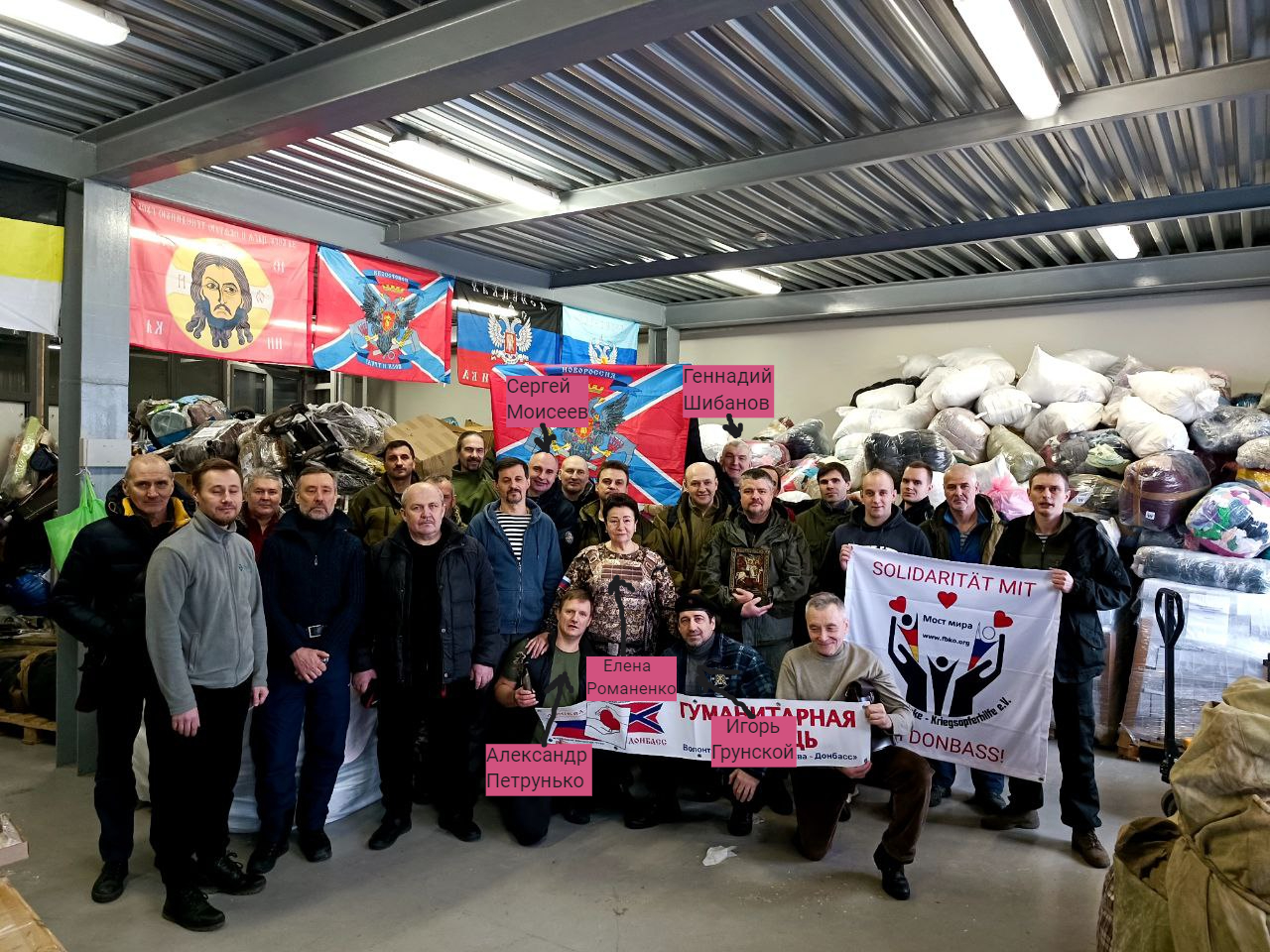
Other well-known participants in a group photo from a trip to Donbass are Sergey Moiseev (chairman of the Kharkiv separatist organization Triune Russia, organized events together with far-right activist, organizer of the Russian Marches Georgy Borovikov and his Right Russia party) and neo-Nazi Gennady Shibanov – coordinator movement "Russian Moscow" and an active participant in the "Russian Marches". In 2013, Shibanov took part in riots in Moscow's Biryulyovo Zapadnoye district, where local residents, outraged by the murder of 25-year-old Yegor Shcherbakov, set fire to a shopping center and smashed a vegetable warehouse, demanding the removal of illegal migrants from there. As part of the investigation of those events, Shibanov was detained, but immediately released . LiveJournal user ivan777lapshin claimed that employee Aleksey Okopny ordered this. Okopny allegedly stated that Shibanov was their employee and was in Biryulyovo on instructions from the Ministry of Internal Affairs.
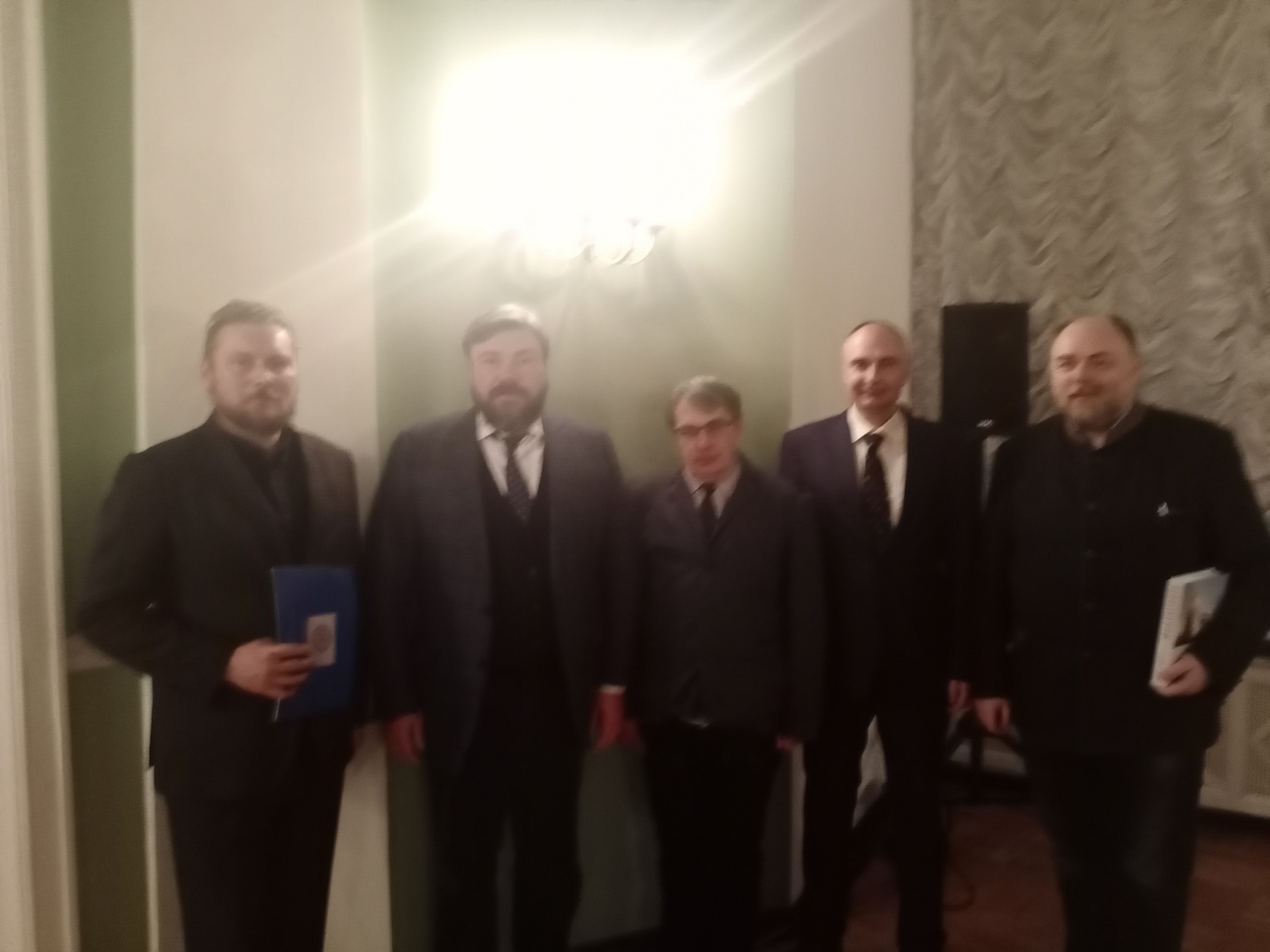
In the center of the photograph is Elena Romanenko, the founder of the Moscow-Donbass International Exhibition Group. In 2016, she founded the Ruspomoshch Foundation, which sends the children of Donbass to the Cossack camp Predtechensky Gorodok for "spiritual, moral and military-patriotic education." The project receives money from the Presidential Grants Fund. “At the base of the camp, children undergo initial military training, strengthen their faith in themselves, acquire spirituality, learn new and useful things, and find good friends,” the project page says .
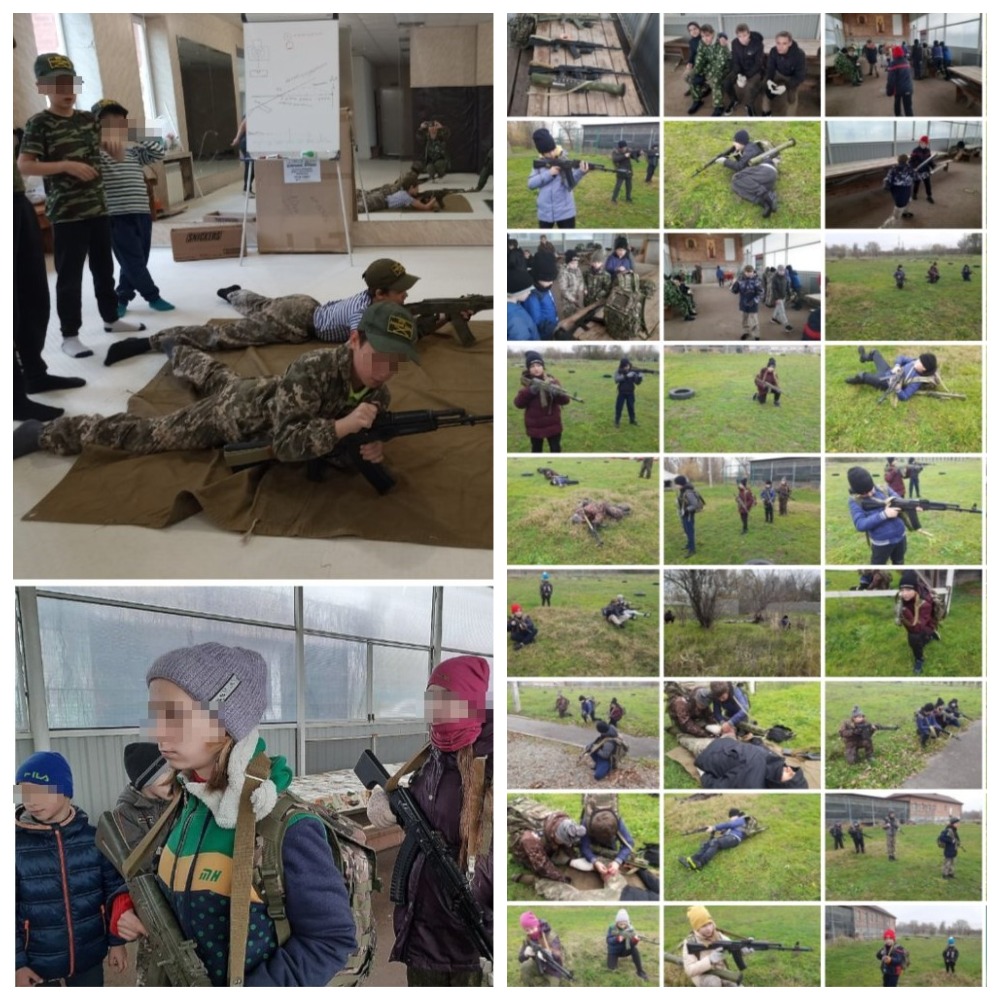
The late Alexander Miroshnichenko, a nationalist and militant of the Prizrak battalion, who fought in the Donbass since 2014 and died last fall, also raised children in this camp. Kilints, Petrunko, Moiseev, Shibanov and Romanenko were at the funeral of Miroshnichenko. In the photo from the funeral ceremony, Olga Beltseva is also visible – a deputy of the Moscow municipal district Otradnoye from United Russia. Beltseva's son is fighting in Ukraine and she was one of the mothers of servicemen whom Vladimir Putin met in November at his residence in Novo-Ogaryovo. Edinorosska is also a volunteer of the Moscow-Donbass MVG.
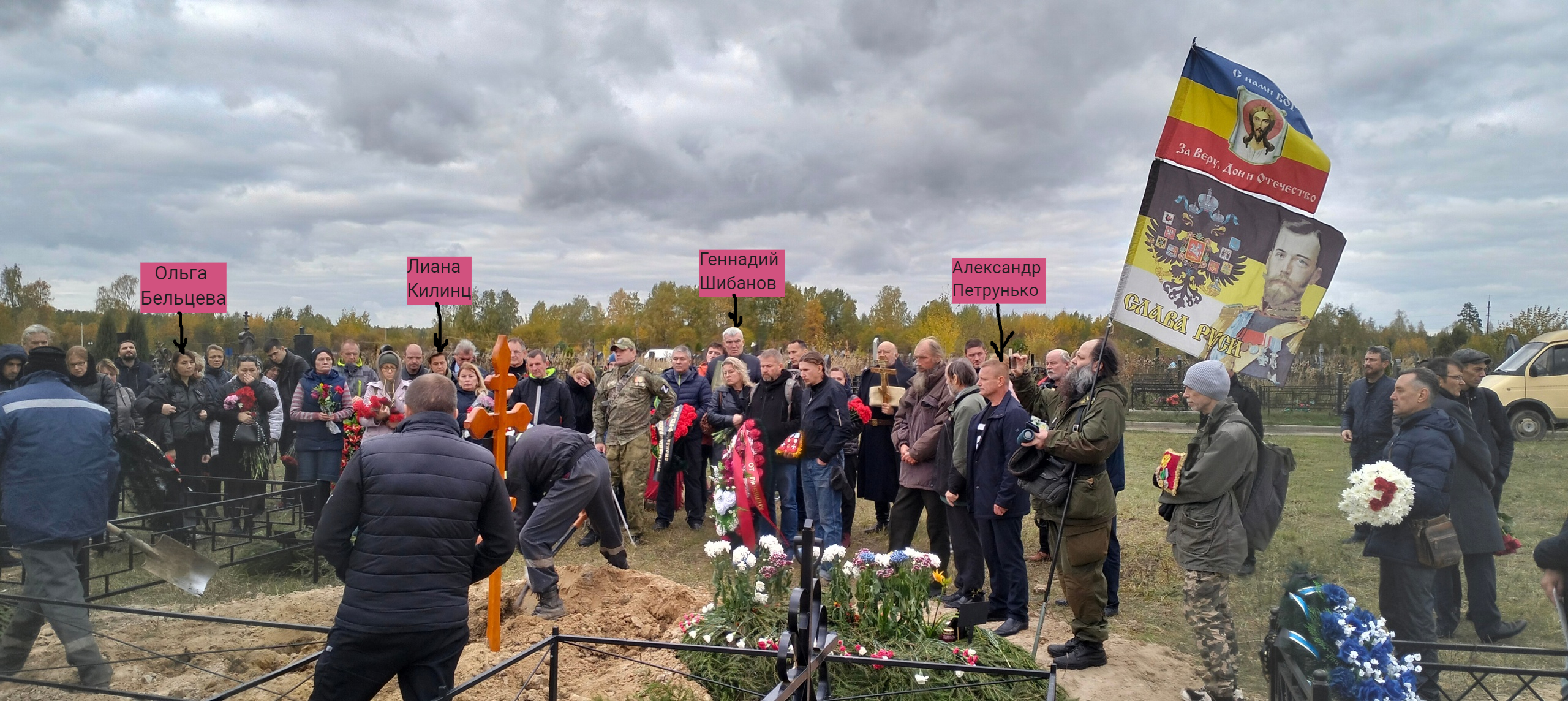
And at the wake of Miroshnichenko, together with Kilints and Romanenko, Lyudmila Chubakova, another provocateur from SERB and a participant in the Russian Marches, was photographed .
In another photo from the January delivery of humanitarian aid, Kilints poses in an embrace with fitness trainer Igor Grunsky.
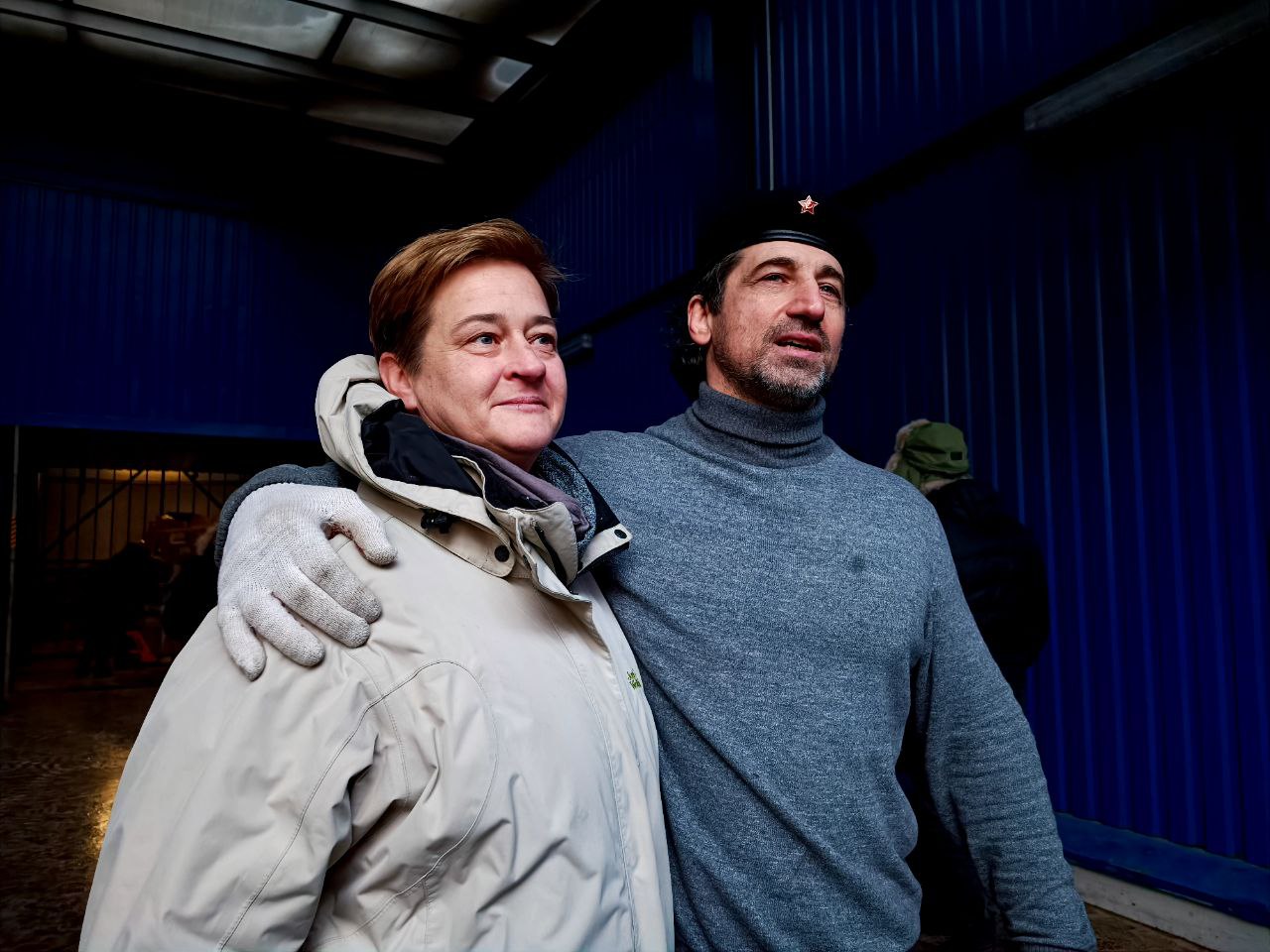
Apparently, Grunskoy is also a member of Moiseev's organization Triune Russia, and often appears in photographs of the movement. In addition, the fitness trainer takes part in the events of the Union of Orthodox Banner Bearers, which is close to the Russian Orthodox Church. This organization belongs to Orthodox national fundamentalism, is known for dispersing LGBT marches in Moscow, as well as public burning of books by JK Rowling, Vladimir Sorokin and Edward Radzinsky. Its members use the slogan "Orthodoxy or death!", recognized as extremist on the territory of the Russian Federation. One of the leaders of the Union of Orthodox Banner Bearers, Igor Miroshnichenko, is a neo-Nazi and Holocaust denier . Most likely, Grunskoy is also a member of this organization – he is even photographed as a model in T-shirts of Miroshnichenko's design studio "Russian Symbol".
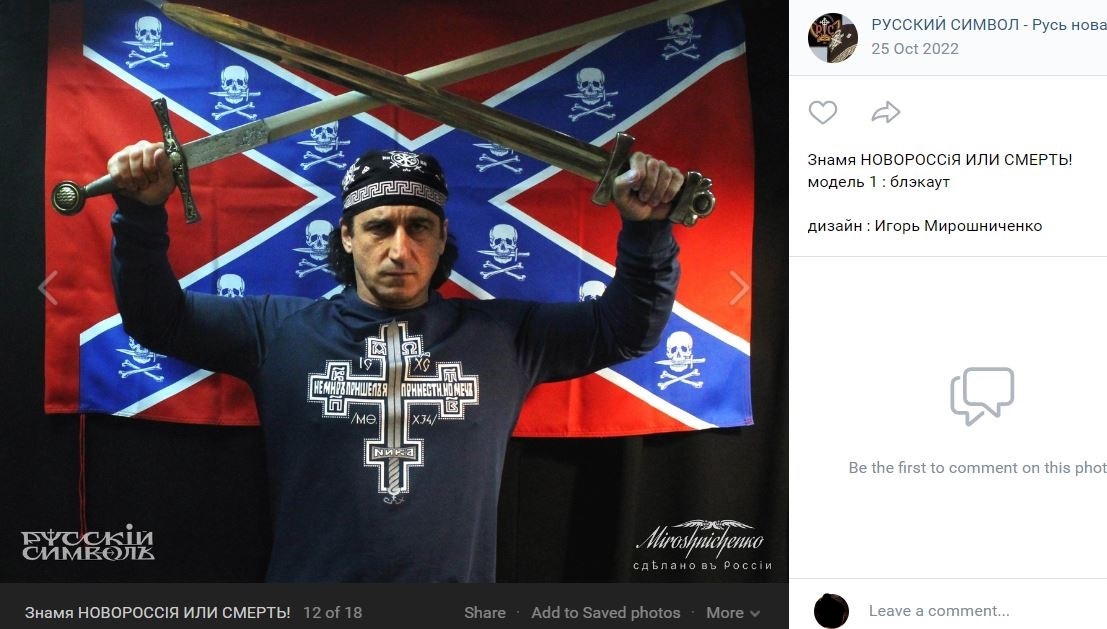
"Anti-Fascist" does not hesitate to cooperate with the movement, a member of which committed a high-profile murder on the basis of interethnic hatred. In June 2019, her foundation delivered a humanitarian cargo together with members of the National Conservative Movement Andrey Yerin and Andrey Serbiyan. In Russia, NKD activists are known for attacking members of the LGBT community along with SERB. On that trip to Donbas, as in many subsequent trips, SERB provocateur Oleksandr Petrunko participated together with members of the NKD.
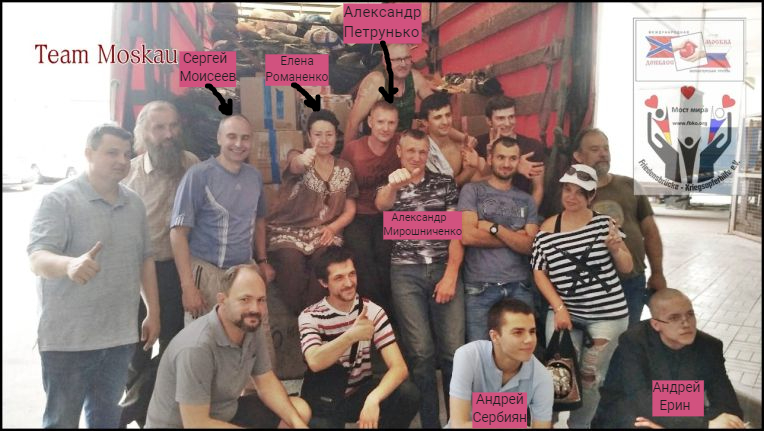
At NKD events, Erin and Serbian almost always appear together with their comrade-in-arms Andrey "Bely" Skvortsov. "Bely" also participated in SERB's power actions along with Petrunko, Chubakova and the leader of the group, Igor Beketov (Gosha Tarasevich). For example, in May 2019, they tried to disrupt the Side by Side LGBT festival.
Two weeks after the delivery of the humanitarian cargo to the Donbass, Andrei "Bely" was detained on charges of murdering a citizen of Kyrgyzstan in the center of Moscow.
“At about 10 p.m., three comrades: 19-year-old sports goods store consultant Konstantin (all names have been changed), 18-year-old Grigory and 17-year-old Anton were walking in the park and drinking cherry ale. Two Kyrgyz passed by them – 25-year-old Uual and 32-year-old Altyn. They were returning home from work (both work at a construction site) to the hostel, which is located on the same street. As Konstantin later explained, it seemed to him that the guest workers were hostile – either they said something, or they looked wrong. He took out a gas canister and sprayed a corrosive liquid into their faces. After that, a fight broke out, and three friends pulled out knives. Everyone had weapons, but at the moment it has not yet been established who specifically delivered the blows. However, two guys testified against their younger comrade, ” wrote Moskovsky Komsomolets.
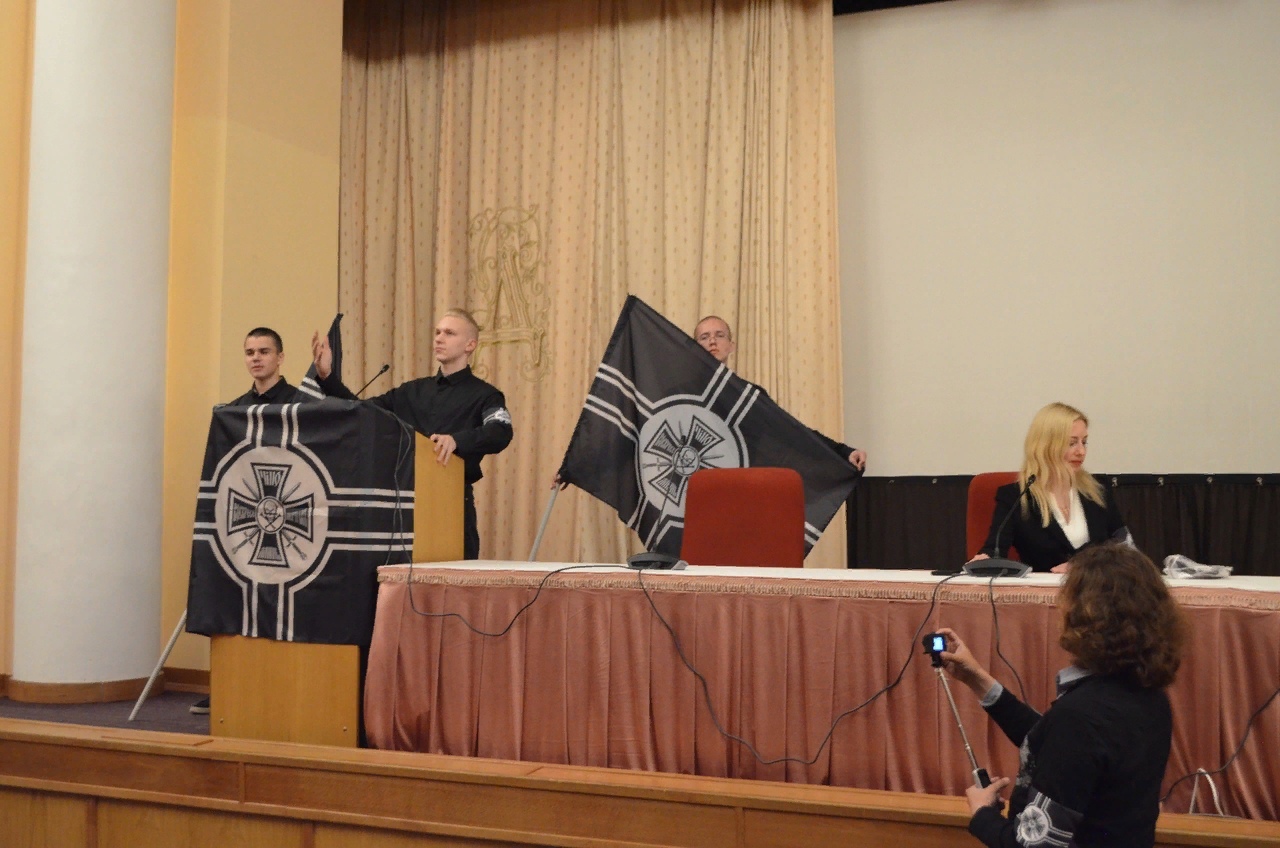
The “younger comrade” turned out to be “Bely”, whom “MK” calls “the most ardent <of the three suspects> supporter of ultra-right views and a well-known nationalist in narrow circles.” Together with his friend Gleb Nazarkin (also a defendant in this criminal case), he founded his own white supremacist group. During a search, “Various edged weapons, knives, machetes, overalls with symbols, other paraphernalia and nationalist literature” were confiscated from “Bely” and his associates. Now, judging by the information in the nationalist public, he is serving 9 and a half years in a penal colony for murder motivated by ethnic hatred.
However, the involvement of a member of the NKD in the murder did not affect the decision of the Bridge of Peace Foundation to cooperate with members of the movement. In the autumn of the same year, the national conservatives, together with the Kilints organization, again took part in the delivery of humanitarian cargo to the Donbass.
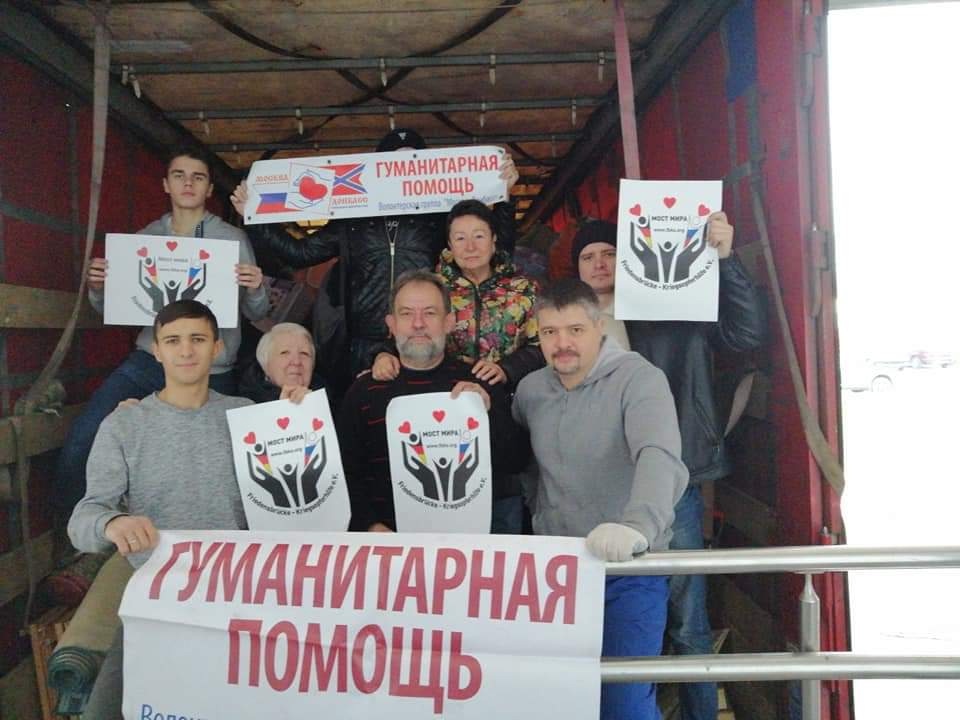
Killer Help
On November 13, 2022, Saule Ivanova, the coordinator of the Moscow-Donbass MVG, published on her VKontakte page a call for help from militants who urgently needed lubricating oil for military equipment. The very next day, the gear oil was found – Ivanova wrote that it would go "to the motorized rifle units of the defenders of Donbass" on November 16.
On November 16, a thank-you post was published on the Telegram channel of the Moscow-Donbass group: “In the bottom line, on board the loaded 20-ton truck today, with the help, not one barrel left, as we were asked (180 liters), but two. And plus four barrels. This oil is very necessary for the maintenance and repair of infantry fighting vehicles, ”the post says. Photos of barrels have also been published: the blue one will go to the DPR, the green one to the LPR.
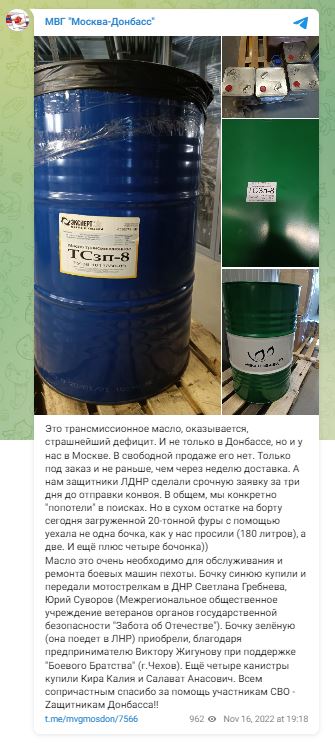
The next day, the same Saule Ivanova and Olga Beltseva from United Russia write that the "twenty-tonne humanitarian" was loaded and sent to the Donbass. They thank Liana Kilints and her foundation "Bridge of Peace – Help for War Victims". In the loading photos, along with Kilints, almost all of her old company – Elena Romanenko (MVG "Moscow – Donbass"), Gennady Shibanov ("Russian Moscow"), Lyudmila Chubakova (SERB).
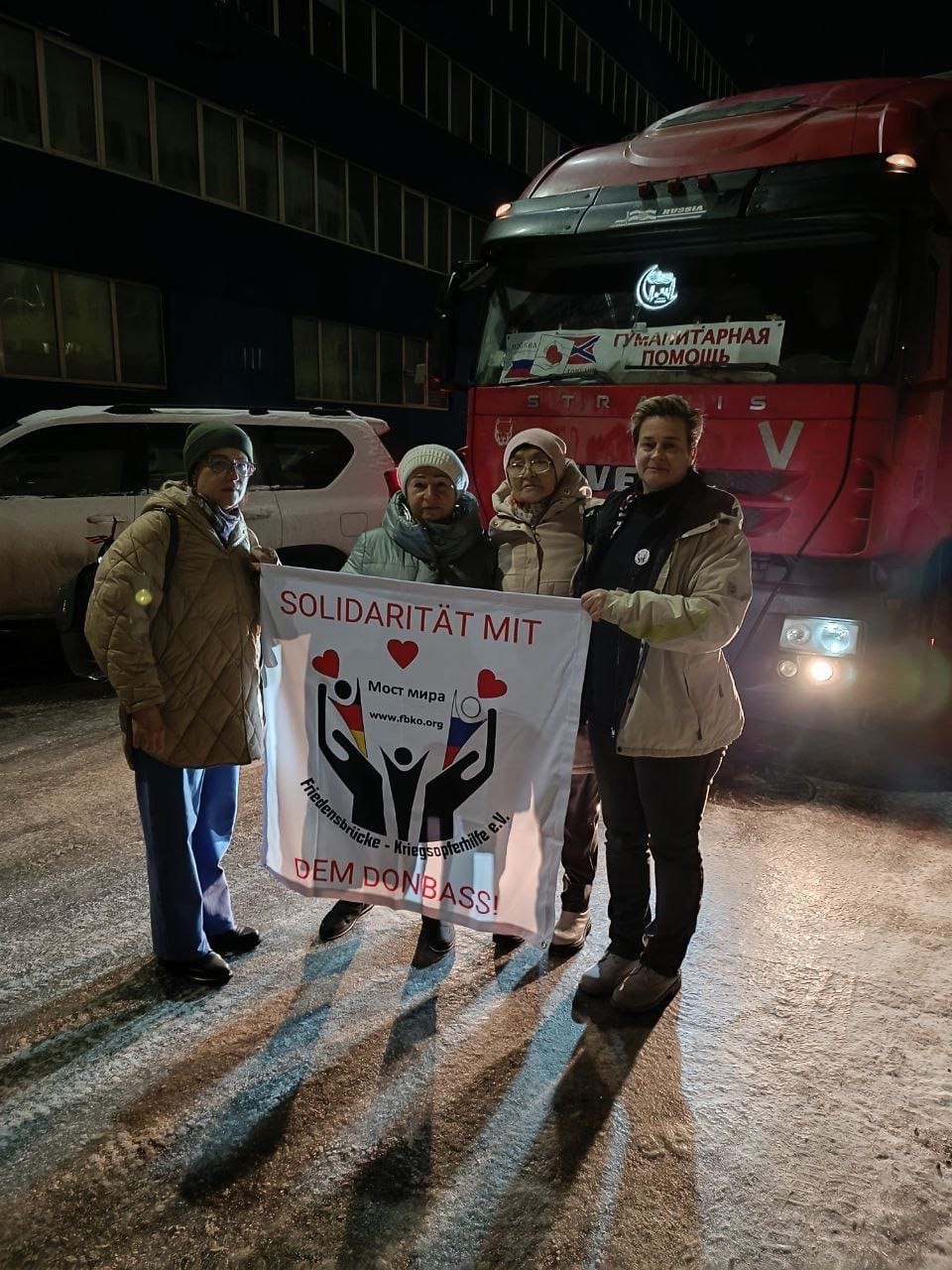
November 22 "Moscow-Donbass" publishes a message that the "twenty-ton" arrived at its destination and unloaded at a warehouse in Donetsk "with financial support" of the Bridge of Peace Foundation. Personal gratitude is declared not only to Liana Kilints, but also to the entire management of the fund – “normal Germans”. The video of the unloading of "humanitarian aid for the victims of war" shows previously purchased barrels of gear oil for infantry fighting vehicles. Kilints herself writes on VKontakte that a vehicle with "humanitarian aid" was delivered.
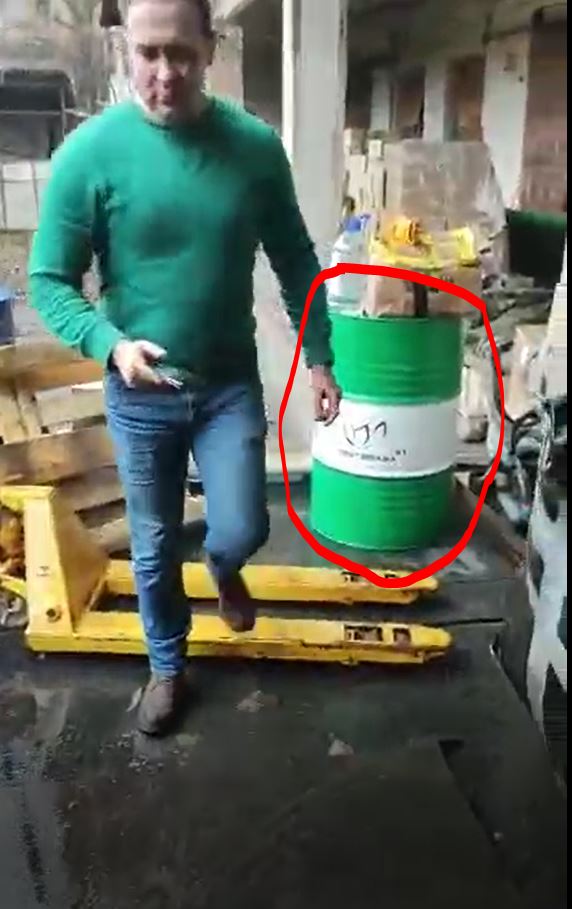
In addition, on January 9-10, Sergey Moiseev, who has been repeatedly mentioned from Triune Russia, collected donations for gasoline to transport thermal underwear, ammunition, thermal imagers and medicines to “our soldiers to the front line.” The loading took place on January 10 at the Triune Russia warehouse. The next day, the Moscow-Donbass MVG announced that it was loading and sending a truck from Moscow. Moiseev also took part in this event – most likely, he loaded his "humanitarian aid" onto the same transport. The photos again show barrels of gear oil, and the text of the message also contains "personal thanks, especially for three barrels of gear oil for combat infantry vehicles." A similar video was published on its website by the Bridge of Peace. The Gumconvoy arrived in Donetsk on 14 January.
At the end of January, the Kilints Foundation helped transport satellite dishes to receive the Internet, as well as weather stations and anemometers for artillery, to Donbass. And in February, the Bridge of Peace also paid for the delivery of an anti-drone gun and a drone, which went to the Cossack regiment of the LPR.
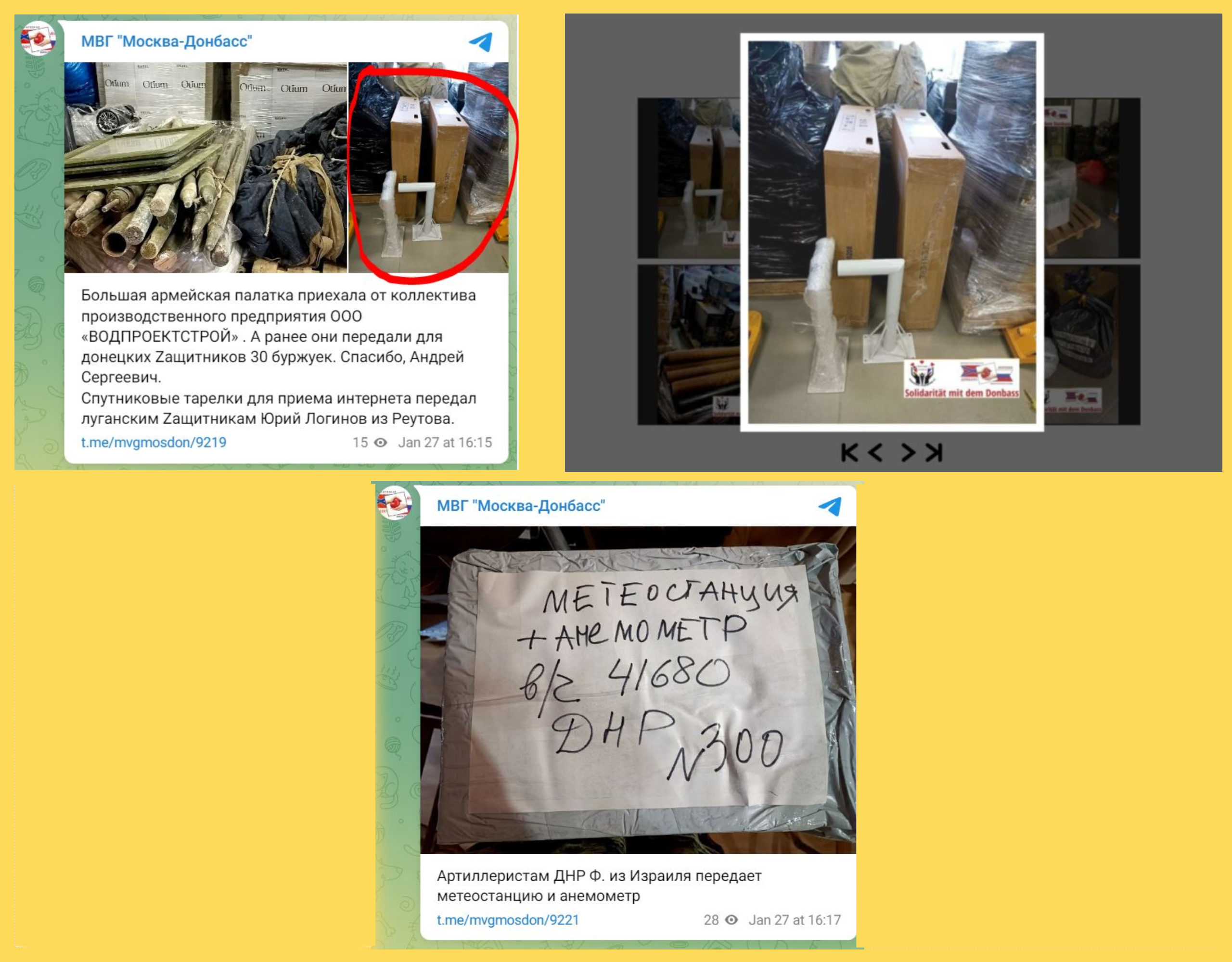
In September 2022, Kilints got into trouble with the law: the Brandenburg police are investigating her foundation on suspicion of inciting hatred and genocide denial. The reason was a photograph on the official website of the Bridge of Peace, which depicts men and women with the flag of Novorossia and the forbidden symbol Z. Now the organization’s account is closed , and the non-profit status (which allowed it not to pay taxes to the German budget) has been canceled. Judging by the message on the Foundation's website, the shipment of humanitarian goods from Germany has been suspended, the transportation is carried out from Moscow. The activist herself left the country, allegedly because her house was “besieged by dubious characters in Ukrainian cars,” and is also in Moscow. Donations for the organization come to her personal German account. “Basically, we are accused of delivering food and water to the wrong people. The reasons for this are purely political. We are unwitting witnesses of the real situation in the DPR and LPR, which after the referendum belong to Russia,” Kilints complained in an interview with RIA Novosti.
However, the Bridge of Peace Foundation – Aid to War Victims is still registered in Germany. With his support, even music festivals are held – one of these is planned in July in the German city of Friesack. “We don't want any election campaigns or advertising of political parties on the festival grounds. We cordially invite all people who stand for peaceful coexistence and through their actions shape the future for the benefit of the earth and the entire human family. We treat each other as equals, which means no rush and no discrimination. We do not tolerate racist, chauvinistic, nationalistic, violent, homophobic, sexist, militant or other discriminatory positions,” the organizers of Pax Terra Musica write on their website. It is not clear how support from the foundation, which, together with neo-Nazis, supplies goods for infantry fighting vehicles and artillery of the Russian occupation forces, is combined with this.
Military-agro-industrial complex
“Bridge of Peace – Aid to Victims of War” is not the only ostensibly charitable organization supplying the Russian military in Donbass. In September last year, the Future of Donbass Association (Aktionsbündnis Zukunft Donbass eV) came to the attention of journalists from the German broadcasting corporation MDR. As the investigators found out , the organization not only cooperates with the association of the same name in Luhansk and the leaders of the self-proclaimed “Luhansk People’s Republic”, but also supplies the separatists, in particular, with radios. The main customs office in Erfurt is checking the association for violations of EU sanctions. The Thuringian Office for the Protection of the Constitution also assured journalists that it was aware of the situation, but did not want to give more detailed comments, since "such public statements are of particular interest to foreign intelligence agencies." However, judging by the Zukunft Donbass website, trucks with "humanitarian cargo" still go to the occupied regions of Ukraine straight from Germany – sometimes on a military truck with the letter Z.
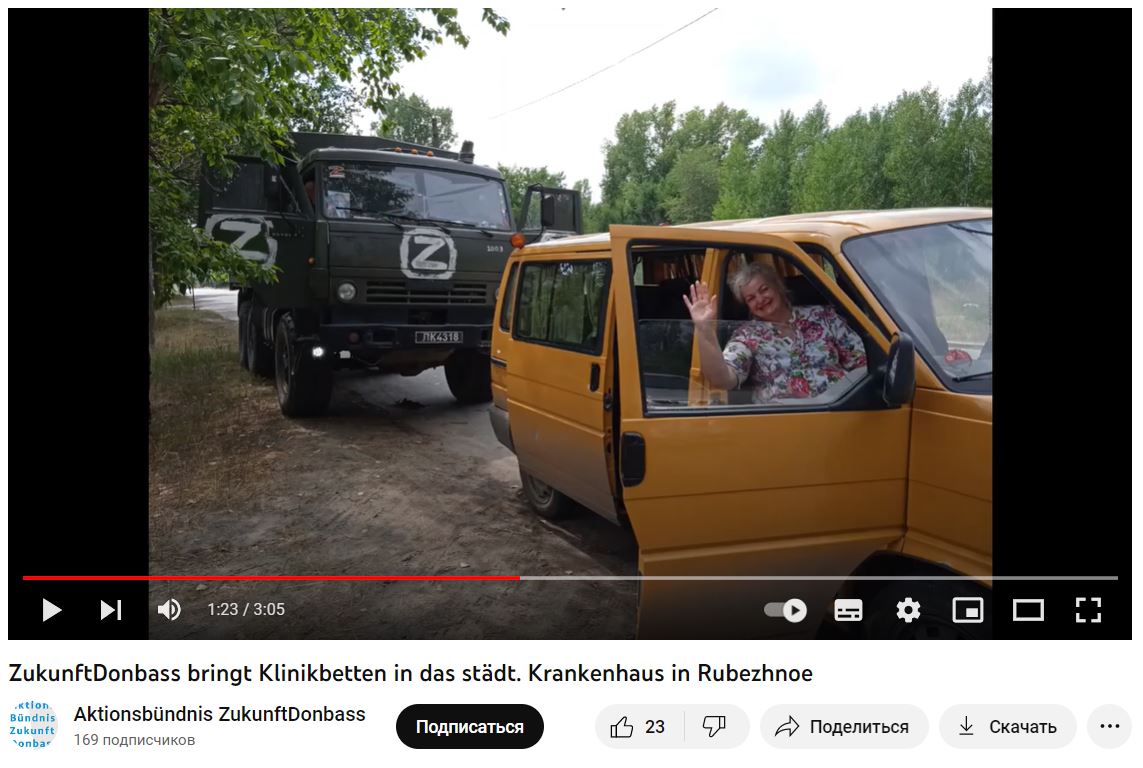
Zukunft Donbass openly supports Russia in the war. Four days before the invasion of Ukraine, a post appeared in the group of the organization on Facebook with the words: “Not everyone can or wants to evacuate. Our donations are for these people. Right now, when the Western cabal of politicians is dodging and ignoring the events in Donbass, we must and will act.” And in July, shortly after the capture of the Ukrainian city of Lysichansk by Russian troops, the group said : “Yesterday was an important day for the people of the Luhansk People's Republic. With the liberation and capture of the city of Lisichansk, the territory of the LPR came under the complete control of the people's militia of the LPR and the armed forces of the Russian Federation. Russian diplomats write about the "humanitarian missions" of Zukunft Donbass – for example, the Russian Embassy in Vienna and the Consulate General in Leipzig .
The organization has a donation account at the Wartburg-Sparkasse (a savings bank in a district of Thuringia). Until recently, the association has collaborated with well-known medical institutions in Germany, such as Helios Klinikum Meiningen (Jena University Hospital) and the nursing home Ambiente in Erfurt. Moreover, as The Insider found out, at least before the outbreak of the war in Ukraine, Zukunft Donbass partners were charities that now support Ukraine and condemn the Russian invasion. From 2016 to 2018, the non-profit organization Human Plus eV, together with Zukunft Donbass, delivered humanitarian aid to Luhansk and other cities of Donbass. Human Plus eV chairman Anestis Ioannidis referred to Zukunft Donbass founder Raisa Steinik as a “freelancer” of her organization, but Steinik herself, who regularly gives interviews to pro-Kremlin TV channels like RT, often presented herself as “Human Plus’ coordinator for Eastern Europe.”
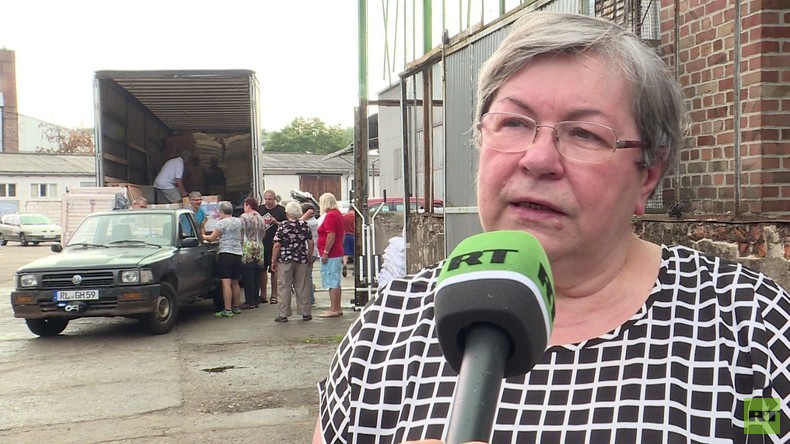
Meanwhile, Human Plus is supported by the largest German and Swiss companies – for example, Leisure Cargo, Jet Aviation. Now the organization is still helping Ukraine, but it no longer mentions cooperation with Zukunft Donbass. According to Ioannidis, he communicates with the mayor of Kiev, Vitali Klitschko, who provides him with a list of necessary goods to help the residents of the Ukrainian capital. The partner of Human Plus is now the foundation of the famous German actor Til Schweiger. Human Plus did not respond to The Insider's questions about the collaboration with Steinik.
The organization "German-Ukrainian Center" (Deutsch-Ukrainisches Zentrum eV) supported the collection of donations for two clinics in the Donbass region. The project allegedly belonged to Human Plus, but the donation link led to the details of Zukunft Donbass. Now the German-Ukrainian Center is helping Ukrainian refugees in Germany and delivering humanitarian aid to cities controlled by Kiev, for example, to Lvov and the city of Ivankov, liberated in April last year, in the Kiev region.
As for the founder of Zukunft Donbass, Raisa Steinik, according to Deutsche Welle, she was born in the Zhytomyr region, but since 1974 has been living in the German federal state of Thuringia. “During the years of Ukraine's independence, she repeatedly visited the country and constantly monitored the situation in her homeland. The outbreak of hostilities in eastern Ukraine in 2014 shocked her,” wrote DW in 2017. The woman told reporters that she almost fell into depression from the sight of bombed-out houses in the Donbass “and decided to help hospitals in the Lugansk region.” However, The Insider studied Steinik's biography and found out that her support for the Donbass may be related to business interests in Russia.
The woman's LinkedIn profile says that she works as deputy CEO of the German company CasusBioOil Trading. According to the information on the company's website, it was created to import the camelina plant from Russia to Germany as a biofuel for aircraft. However, due to sanctions in 2014, the project was actually frozen. Despite this, until recently the German company participated in business conferences in Russia. Steinik herself actively promoted the cultivation of camelina for export in an interview with Russian agro-industrial publications.
Fake observers
The Insider found another German charitable organization that openly cooperates with the Russian occupiers – Friedenshilfe Großostheim eV The organization delivers humanitarian aid to the city of Alchevsk, Luhansk region. Together with various organizations of war veterans, "Combat Brotherhood", "United Russia", the Igor Strelkov Charitable Foundation and the trade union of employees of the Ministry of Internal Affairs of the Russian Federation, Friedenshilfe implemented the "Heat of the North" project, aimed, among other things, at interaction between the constituent entities of the Russian Federation and the occupied territories of Ukraine (for example, organizing the participation of Russian athletes in competitions in the Donbass and vice versa).
The Friedenshilfe Großostheim website states that the organization is "politically neutral". At the same time, Friedenshilfe board member Tatyana Raab (Alifanova) in 2018 was an observer at the “general elections” in the so-called LPR. “We visited three polling stations. I was positively surprised by the turnout, there were so many people there, everyone was smiling. In general, it was a holiday for people, they were happy to have the opportunity to come to these elections, ”she said at a briefing, not forgetting to emphasize that people are going to vote in order to achieve“ international recognition of their young Republic ”.


